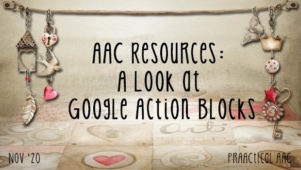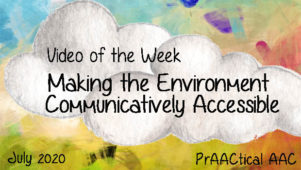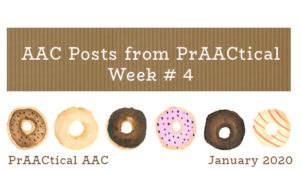PrAACtical Guessing: 5 Apps for Interactive Inferencing
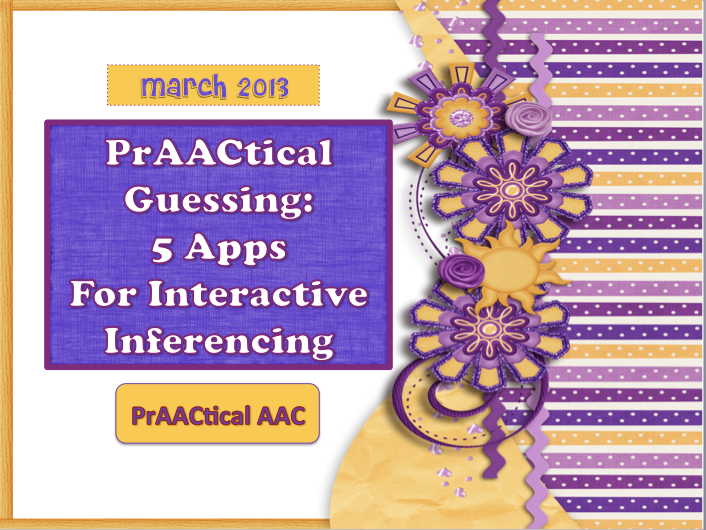
We have been writing and talking about AAC & language strategies that go beyond requesting. And although we start a new month (today) and a new strategy on Saturday, we wanted to close this last day of the work week with a fun way of focusing on a complex but important language skill for ALL learners. If we presume competence, teach, model, and provide activities that are fun and have a variety of response options then everyone can learn to make ‘educated’ guesses and be able to ‘explain’ their choices. There is a difference in making the correct choice and explaining how you made the choice.
This skill of guessing is called inferencing. Inferencing is the process by which a conclusion is inferred from an observation or multiple observations. The conclusion may be correct or incorrect, but conclusions are based on information we have at the time.
As a language skill, we can break this down to the inference or guess and then further break it down to being able to explain how we arrived at a specific inference. An example of this would be to look at a picture of a girl in a bathing suit, with a towel and sunscreen and ask “Where do you think she is going”? Some learners would correctly guess ‘swimming’, others would know to put the picture with a pool, while others still could explain “swimming because she has a towel and sunscreen which are swimming things”.
Recently, we have found several fun apps that lend themselves to focusing on inferencing. To work on the language aspect of inferencing, the app needs to be used interactively with a language facilitator who can guide learners to using language to make & explain the inference needed to play these app games. AAC displays that allow for the core and fringe word vocabulary to make guesses and explanations are also needed. Some examples of core vocabulary we make sure to include is: “my”, “thinking”, “know’, “would”, “because”, “better”, “maybe”, “other”, “guess”, “happen”, “could”, “nothing”.
Take a look (many of them are free or just a few dollars) and let us know how you worked on inferencing and which ones if any are favorites.
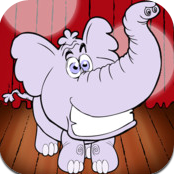 Animal Game Show- Whose Toes Are Those? (currently $1.99)- Presented in a game show fashion, just the toes of an animal are revealed. The user then selects a guess (from a choice of 3). If the guess is correct, the full animal is revealed with a cute dance. If the guess is incorrect, the selection of choices is reduced to 2 and then 1 (great prompting system). This is where the interaction comes in to play. Talking and modeling ‘the best guess’ and why you made the guess will help the learner begin to make and explain educated guesses or inferences. With prAACtice, more complexity of guesses and explanations can begin.
Animal Game Show- Whose Toes Are Those? (currently $1.99)- Presented in a game show fashion, just the toes of an animal are revealed. The user then selects a guess (from a choice of 3). If the guess is correct, the full animal is revealed with a cute dance. If the guess is incorrect, the selection of choices is reduced to 2 and then 1 (great prompting system). This is where the interaction comes in to play. Talking and modeling ‘the best guess’ and why you made the guess will help the learner begin to make and explain educated guesses or inferences. With prAACtice, more complexity of guesses and explanations can begin.
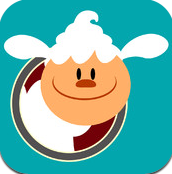 Knock Knock Guess Whose There? (currently free)- Each turn begins with the question, “Knock knock whose there”? Animals jump up so you can see part of it through a peep whole in a door. Then you select a ‘guess’ of which animal it might be from a field of 3. If a guess is incorrect, the animal jumps up again but with the corresponding animal sound (so the user is getting a prompt). Once a correct guess is made, the door disappears and the whole animal is revealed. Again, this is where the interaction comes in to play. Talking and modeling ‘the best guess’ and why you made the guess will help the learner begin to make and explain educated guesses or inferences. The level of complexity of guesses and discussion can be individualized.
Knock Knock Guess Whose There? (currently free)- Each turn begins with the question, “Knock knock whose there”? Animals jump up so you can see part of it through a peep whole in a door. Then you select a ‘guess’ of which animal it might be from a field of 3. If a guess is incorrect, the animal jumps up again but with the corresponding animal sound (so the user is getting a prompt). Once a correct guess is made, the door disappears and the whole animal is revealed. Again, this is where the interaction comes in to play. Talking and modeling ‘the best guess’ and why you made the guess will help the learner begin to make and explain educated guesses or inferences. The level of complexity of guesses and discussion can be individualized.
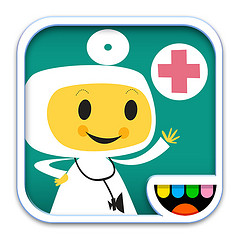 Toca Doctor- (currently $2.99)- We love playing all the non-competetive ‘doctor’ games. There are so many opportunities for inferencing. Discussion of reasons for the ‘sick’ areas (i.e., ate too much candy for dirty teeth, got too close to a cat for scratches) is good inferencing practice for everyone but especially for learners who need practice with multiple possible correct answers versus only one.
Toca Doctor- (currently $2.99)- We love playing all the non-competetive ‘doctor’ games. There are so many opportunities for inferencing. Discussion of reasons for the ‘sick’ areas (i.e., ate too much candy for dirty teeth, got too close to a cat for scratches) is good inferencing practice for everyone but especially for learners who need practice with multiple possible correct answers versus only one.
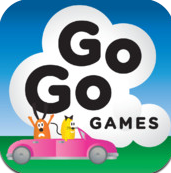 Go Go Games- (currently $1.99)- These games involve visually attending to patterns with multiple cues in a fun and engaging way. These games are made to be played independently but can also be used interactively to provide inferencing opportunities. The inferencing for these games can be around a labeling of the correct ‘match’ and why.
Go Go Games- (currently $1.99)- These games involve visually attending to patterns with multiple cues in a fun and engaging way. These games are made to be played independently but can also be used interactively to provide inferencing opportunities. The inferencing for these games can be around a labeling of the correct ‘match’ and why.
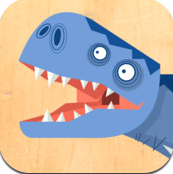 Piece Me Dinosaur (or most puzzle apps) (currently .99)- We love using puzzles for inferencing through modeling and discussion. We choose pieces and discuss ‘why’ they might fit in a certain place in the puzzle. There are opportunities to guess what the whole puzzle will be (in this case- type of dinosaur). Piece Me Dinosaur is beautiful with an obvious focus on the artwork so everyone can enjoy.
Piece Me Dinosaur (or most puzzle apps) (currently .99)- We love using puzzles for inferencing through modeling and discussion. We choose pieces and discuss ‘why’ they might fit in a certain place in the puzzle. There are opportunities to guess what the whole puzzle will be (in this case- type of dinosaur). Piece Me Dinosaur is beautiful with an obvious focus on the artwork so everyone can enjoy.
Filed under: PrAACtical Thinking
Tagged With: Apps, Inferencing, language
This post was written by Robin Parker

